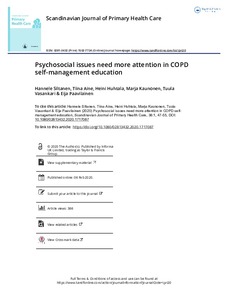Psychosocial issues need more attention in COPD self-management education
Siltanen H; Aine T; Huhtala H; Kaunonen M; Vasankari T; Paavilainen E
Psychosocial issues need more attention in COPD self-management education
Siltanen H
Aine T
Huhtala H
Kaunonen M
Vasankari T
Paavilainen E
TAYLOR & FRANCIS LTD
Julkaisun pysyvä osoite on:
https://urn.fi/URN:NBN:fi-fe2021042823293
https://urn.fi/URN:NBN:fi-fe2021042823293
Tiivistelmä
Objective: To find out how regularly the contents of patient education regarded as essential for COPD patients' self-management are provided by healthcare professionals in specialised healthcare (SHC) and primary healthcare (PHC) in Finland. Design: A cross-sectional study based on an e-questionnaire with 42 items on the content of self-management education of COPD patients. Setting: The study sample included all public SHC units with pulmonary outpatient clinics (n = 29) and nine out of 160 health centres in Finland. Subjects: 83 doctors and 162 nurses. Main outcome measures: The respondents' answers on how regularly they included the contents regarded as essential for COPD patients' self-management in their education of COPD patients. Results: COPD patients were educated regularly on medical issues regarding COPD treatment, such as smoking cessation, exercise and pharmacological treatment. However, issues vital for coping with the disease, such as psychological well-being, stress management or fatigue, were often ignored. Patient education in SHC seemed to be more systematic than education in PHC. The education provided by the asthma/COPD nurses (n = 70) was more systematic than the education provided by the other nurses (n = 84). Conclusion: Healthcare professionals' continuous education should cover not only the medical but also the psychosocial aspects of coping with COPD. The role of doctors and nurses should be considered to ensure that there is no gap in COPD patients' education. Training asthma/COPD nurses and promoting specialised nurse-led asthma/COPD clinics in primary care could be beneficial while improving practices of patient education that enhance patients' ability to cope with the disease.
Kokoelmat
- Rinnakkaistallenteet [27094]
